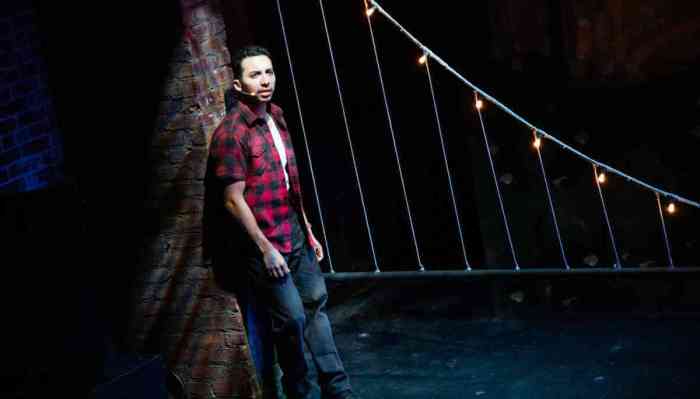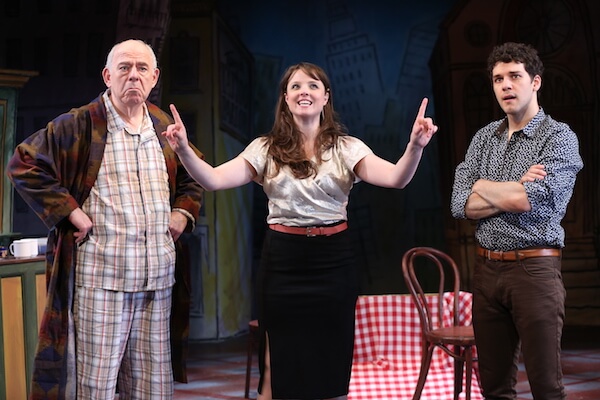 Shakespeare was an inveterate plot stealer, and if turnabout is fair play the creators of the rollicking Off-Broadway musical “Desperate Measures,” with book and lyrics by Peter Kellogg and music by David Friedman, have paid suitable homage to the Bard. The plot-lifting of “Measure for Measure,” however, is about as far as it goes.
Shakespeare was an inveterate plot stealer, and if turnabout is fair play the creators of the rollicking Off-Broadway musical “Desperate Measures,” with book and lyrics by Peter Kellogg and music by David Friedman, have paid suitable homage to the Bard. The plot-lifting of “Measure for Measure,” however, is about as far as it goes.
That said, there is something inherently cynical about creating a boot-scooting, over-the-top, Wild West romp out of a story about a government official using his power to coerce sex from a less powerful woman — a nun, no less — in order for her to get something she wants… and then, when he thinks she has complied, reneging on the deal. The only way that the nun is able to save her soul, as she sees it, is to cook up a trick where a woman who is essentially a sex worker slips into the bed at the last moment. Yet one of the questions Shakespeare raises is whether in even agreeing to the deception, the nun is already compromised in her virtue. The titular desperate measure becomes, then, a question of relative morality, one that has kept scholars talking for centuries. The essential question remains: how far will one go and how malleable are one’s beliefs?
That perhaps is why “Desperate Measures” is set in the mythic American West. The show’s creators place the tale in a time and place with its own rules, as the myth goes. In search of a good time, they ask us not to look too closely at a plot that strikes a particularly dull chord in the contemporary environment or at the hegemonic masculinity that is part of the myth of the American West, prevalent throughout Shakespeare and also clung onto by two many men today.
Two shows about the cost of getting what we want
The show itself is classic Off-Broadway fare — broad, campy, juvenile. Director Bill Castellino plays for yucks, rather than laughs, putting a veneer of vaudeville over the entire proceeding. Kellogg’s book is written in rhyming couplets. Some of them are funny, others land with a thud. Friedman’s music is catchy, though formulaic, and his lyrics are often clever. So, if you can get past the politics and have a penchant for hokey silliness, the show may be pleasant enough, if not remotely memorable.
As so often happens in these types of shows, the performers are so much better than the material. In particular, Peter Saide as the Sheriff has a great voice and big presence that makes him a dominating presence on the small stage. Lauren Molina, who has a magnificent voice, gets to play very broadly as Bella Rose, the saloon dancer who agrees to impersonate the nun in the sheets. Sarah Parnicky as Sister Mary Jo is really delightful as a pure ingenue with a spectacular voice. The rest of the company — Nick Wyman as the lecherous governor, Gary Marachek in a variety of small roles, and Conor Ryan as Bella’s love interest and the brother Sister Mary Jo wants to save from death are all good in limited parts.
For every sublime Shakespeare musical adaptation like “West Side Story,” “Kiss Me Kate,” and “The Boys from Syracuse,” there are those that fall way short. “Rockabye Hamlet” and “Oh, Brother” come to mind. “Desperate Measures” isn’t the worst of these, but it’s nowhere near the best. Had the creators dug a little beneath the surface of “Measure for Measure,” the result might have been quite compelling and seemed, well, less desperate.
Morality in the 17th century was a lot less malleable than it is in 2018. Today, morality is often situational, defined by the individual in the moment. That’s one of the themes that runs through “Dan Cody’s Yacht,” from Manhattan Theater Club, which just closed at City Center. The title is an obscure reference to “The Great Gatsby,” where a young Gatsby is transported into a world of wealth he aches to enter and decides to do whatever it takes to get there. That it doesn’t end well for Gatsby — or for his fellow striver and literary brother Clyde Griffiths in Dreiser’s “An American Tragedy” — is not the subject here. Rather, the ethos of Kevin O’Neill, a rich man who has achieved his riches through manipulating money, is to grab what you can, never apologize, and take full advantage of the benefits of money. That, sadly, might seem prosaic today, but there’s a play afoot because Kevin comes up against Cara Russo, a local teacher who believes in education, merit, and hard work to achieve goals. Kevin and Cara are at odds over a ballot measure in their community that would combine a rich and a poor school district. It’s not a challenge to guess who is on which side. When Kevin promises to invest for Cara and produces strong results, her virtue is in jeopardy when she sees how she personally gains even when others don’t have that opportunity — a provocative challenge to her belief system.
Playwright Anthony Giardina does offer a fair fight for both sides of the issues and makes no pronouncements about which is right. He cleverly expands the theme by looking at how the parents’ choices affect their teenage kids. Conor, Kevin’s son, is a conventional, spoiled white guy; Cara’s daughter Angela is more realistic about her chances with or without the money Kevin ultimately offers her. Conor has never known life without money. Angela is seduced by the idea but has a colder eye towards the way life really is. The play is overwritten in some scenes and the characters veer towards stereotypes, but the dramatic exploration of economic disparities is consistently engaging.
Director Doug Hughes mined the material for some real human moments, especially from Kristen Bush as Cara and Casey Whyland as Angela. Perhaps playwright Giardina does have a dog in this race after all.
In the end, Cara makes what she claims is a moral choice. What drove that? Was it her objection to the way the money was made or fear that she could lose the money she had made so far? If anything after her foray into the stock market, she learned about situational morality… and that, despite how she likes to think of herself, even she is corruptible.
DESPERATE MEASURES | New World Stages, 340 W. 50th St. | Mon., Wed.-Thu. at 7 p.m.; Fri.-Sat. at 8 p.m.; Thu., Sat. at 2 p.m.; Sun. at 3 p.m. | $59-$89 at telecharge.com or 212-239-6200 | Two hrs., with intermission


































